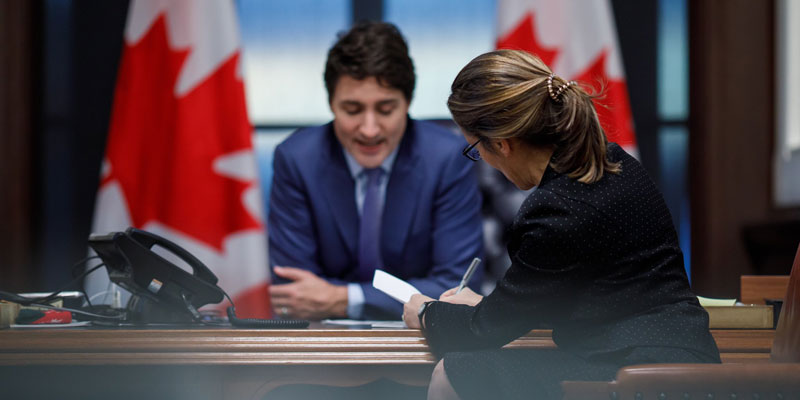Trudeau government continues to dodge democratic accountability

According to Finance Minister Chrystia Freeland, next week the Trudeau government will provide an “update” on its 2020 spending. But in fact, the government has not delivered a full federal budget since March 2019, more than 20 months ago, demonstrating little regard for democratic accountability.
The democratic tradition calls for annual budgets with the government of the day being held accountable, both by Opposition in Parliament and Canadian citizens, for its short-term and longer-run spending, taxing and borrowing. Remember, when the Liberals tabled their last full budget, they had a majority government, no one had heard of COVID-19, and the economy was growing—albeit slowly.
The government delivered an economic update (or “snapshot”) in July 2020. However, the financial and economic information was limited to the current fiscal year (2020-21) with no insight about future spending, taxes or debt given current circumstances and future expectations.
Indeed, the snapshot was worrying. Federal spending was expected to increase from $350.8 billion last year to $592.6 billion, and additional spending was announced shortly thereafter. The national debt was projected to exceed $1 trillion. In fact, the International Monetary Fund’s most recent analysis of industrialized countries projected that Canadian governments would borrow more than any other high-income country (35 in total) in 2020 and spend more than all countries except France, Belgium, Finland, Italy and Austria.
The prime minister, new finance minister and other members of the government argue that circumstances are simply too fluid for a full budget. The problem with this argument is that other governments who face the same circumstances have delivered budgets. Despite it being an election year, our neighbours to the south delivered a budget and the United Kingdom issued a budget early in the COVID crisis (and has provided several subsequent updates). But we don’t need to look outside Canada as most provinces have delivered budget—from Saskatchewan to Ontario—with future projections about spending, taxes and borrowing.
The Trudeau government has also not released a long-term forecast of its spending, taxing and borrowing since 2018. At the time, the government projected the federal budget would not be balanced until at least 2040. A recent Fraser Institute study projected that Ottawa would not balance its budget at any time over the next 30 years—absent a change in policy—and that federal debt (as a share of the economy) could exceed levels reached in the early 1990s when the country faced a near-debt and currency crisis.
It’s hard not to interpret the Trudeau government’s ongoing refusal to deliver a full budget as yet another example of avoiding accountability. Recall that in the early days of COVID, the government sought unlimited spending, taxing and borrowing powers for 21 months. After parliamentary and media backlash, the government backtracked and secured authority to spend and borrow as needed without parliamentary approval to the end of September—still limiting oversight and accountability.
Moreover, the Parliamentary Budget Officer continues to publicly express frustration with a lack of transparency, disclosure and access to information by the federal government on its spending. And also remember that this is a minority government, which lost the popular vote in the last election with the lowest share of the popular vote for any party forming government in Canadian history.
Simply put, for public scrutiny, this federal government must deliver a full budget and accounting of its current and future planned spending, taxing and borrowing. The government says it will present only an abridged update this year with a full budget next spring. To hold the government accountable, citizens must be aware of the decisions being made by Ottawa, which affect us today and tomorrow. This can only be done with a full budget.


